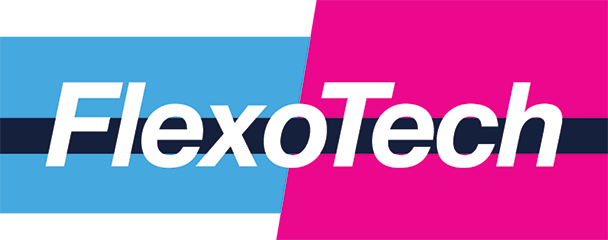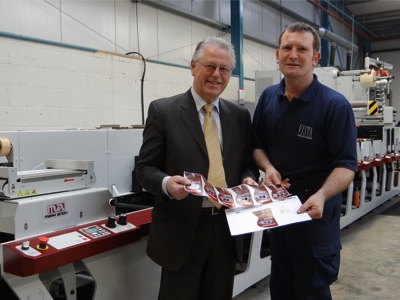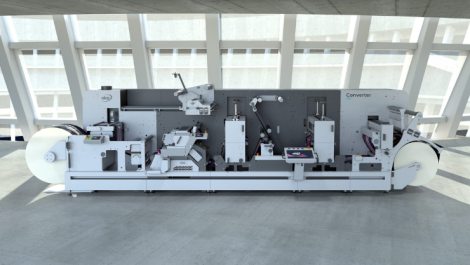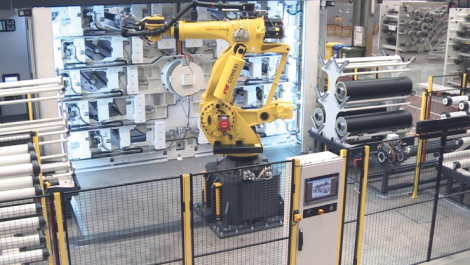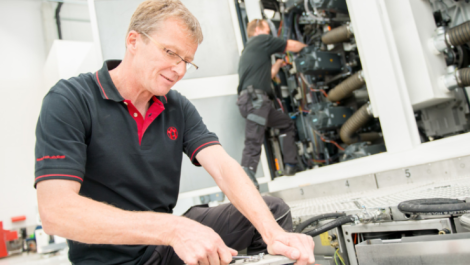The market for narrow web presses for labels is well developed and there is a number of machine manufacturers filling the closely contested space. Despite tough economic times, presses are still selling as the labels and packaging market continues to grow and develop. By Neel Madsen.
The common goal for all narrow web flexo press manufacturers is helping printers reduce downtime, improve profitability and produce highest quality print. Making shorter runs more profitable is a major challenge not least to stave off digital, which is poised to make inroads into the flexible packaging market in the narrow and mid web sector over the next few years.
Size matters
There are several noticeable trends in this market. One current trend is for wider versions of established models, aimed mainly at opportunities in short run flexible packaging and folding carton. This takes us into the realm of mid web presses, although with so many different sizes and expanded capabilities, the boundary between narrow and mid size is becoming somewhat blurred.
Omet has expanded its presses and now offer the Varyflex V2 in four printing widths, the widest two at 670 mm and 850 mm. MPS has launched the EXL Packaging press which at its widest is 660 mm, while Gidue’s Master M5 flexo is available in 620 mm. Having introduced the new FL-3 flexo press last year, Edale has just announced that this will be followed in 2014 with a 760 mm wide version,the new FL-5.
Keep them lean
Lean is a key concept for Nilpeter. This aims to reduce all waste be it material, time or staffing. Jacob Sørensen, manager of the company’s technology centre in Denmark, is the in-house lean expert. ‘We have been working intensely with lean manufacturing principles since 2004, starting in our own production with drastic changes of our setup, and moving on to integrate lean thinking into our presses,’ he explained.
One customer benefitting from this philosophy is Danish label printer Etiflex. Three years ago, the company launched a project to streamline its printing processes. ‘We had the good fortune of working with Jacob Sørensen, who offered his consultancy on how to organise our people and equipment around the press,’ said production manager and co-owner, Brian Sandgaard. ‘We managed to reduce the time of a job change on our eight colour press from one hour to 15 minutes – a staggering 45 minute reduction!’
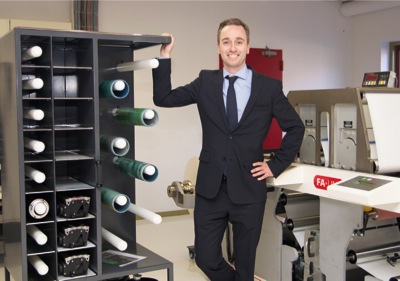 Jacob Sørensen, manager of Nilpeter’s Technology Centre in Denmark with an FA-Line press
Jacob Sørensen, manager of Nilpeter’s Technology Centre in Denmark with an FA-Line press
Quick change
Improving inline processes and eliminating bottlenecks, such as die-cutting, is another focus. Mark Andy has developed the Quick Change Die Cut system to address the issues of cumbersome changeovers, the speed vs quality trade off and errors.
This was done by creating a station where dies are side-mounted into the machine using a portable cart, along with improvements in cutting and matrix stripping, all in all increasing capacity by 19%. Increasing automation cuts downtime by getting the press up and running faster, in register with less waste. MPS has developed Automated Process Control (APC) on all its presses for automated setup and full control.
Its iControl software optimises the machine/operator interface and Nonstop Print Change allows the operator to prepare idle units while the press is running. The APC principle includes die-cutting and matrix stripping which has also been optimised to keep the press running at highest speeds.
Gidue’s presses employ digital technology in the form of several HD cameras on each printing unit which read and manage the print pressure, colour density and the image register, servo-adjusting them as needed without intervention from the operator. It promises that setting up an eight colour job can be done with less than 20 metres of waste.
In combo
Combination printing is another way of adding value. Modular press designs allow for different printing and finishing stations to be added and removed as required so that the press can be tailored to the customer and the products produced. Gallus offers a number of flexible press options which can be configured to the customer’s needs.
Its EMS S line has servo-driven hybrid flexo and screen printing units, with front loading of printing cylinder and anilox roller sleeves, while the print units on its RCS presses are fully modular between offset, flexo, screen and hot/cold foil, and can be interchanged without separating the web or using tools.
Omet’s presses can equally be configured to employ flexo, gravure, offset, silk screen, hot foiling, hot melt adhesive and lamination as needed. At drupa last year, the company also launched a digital unit, the JetPlus, which can be fitted to its XFlex X6 and Varyflex V2 platforms. (For more on combination printing, see also pp 28-29 of our March issue, or read online at www.flexotechmag.com).
Making the right choice
So how does a printing company decide which is the right press to choose? Looking at some recent installations from around the world, the criteria vary from company to company and from country to country. In Sydney, Australia, Globus Group was looking for a machine that suited its production methods as a supplier of specialist food packaging and printed sausage casings for the meat and perishable foods industry.
This was to go into its plant in Wellington, New Zealand, and the choice fell on a seven colour Centraflex CI flexo press from Focus Label Machinery Ltd in the UK. Installed in January this year, the new press incorporates a 1000 mm diameter watercooled CI drum with infrared and forced air drying system. An overdrum turn bar system enables the substrate to be printed on both sides simultaneously, allowing up to six colours to be printed in register front and back (6+6 colour printing).
In order to stabilise the substrate temperature, whilst it is subjected to the heat of the infrared dryers, the new press also incorporates a temperature controlled CI drum. A large capacity external unwind stand provides space for the corona treatment and web cleaning systems. The press is further equipped with a second unwind and rewind, so that two narrow webs can be printed simultaneously, if required.
Globus production director, Darko Supurovic, said, ‘We looked at a number of options, before deciding on the Centraflex. This press ticked all the boxes for us and we were impressed by the ease of operation and the accurate print registration. We were very reassured by the standard of engineering and build quality.
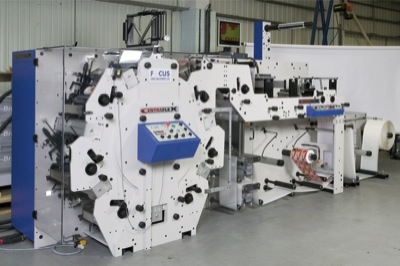 A Centraflex from Focus Label Machinery has been installed at Globus Group in New Zealand
A Centraflex from Focus Label Machinery has been installed at Globus Group in New Zealand
Focus was also very flexible when it came to making a few modifications to suit our particular, specialist requirements. The installation was very professional and we are extremely pleased with the press.’ Focus sales manager, Antony Cotton added, ‘The guys from Globus came over and spent a few days running jobs on our demo press to get a feel for the Centraflex and make sure that it would suit their production methods.
We provide this service because we understand how important it is for our customers to feel comfortable with the press and to ensure that they are investing in the right equipment, for their present needs and also for the future.’ He added, ‘Globus Group is a highly valued new customer and we look forward to building a goodworking relationship with them.’
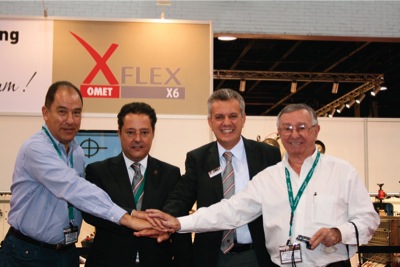 (L-R) Jorge Pabon, general manager of Etipress with Omet Ibèrica representative, Eduard Pont, Marco Calcagni, Omet sales director, and Joaquin Guerra, partner of Etipress
(L-R) Jorge Pabon, general manager of Etipress with Omet Ibèrica representative, Eduard Pont, Marco Calcagni, Omet sales director, and Joaquin Guerra, partner of Etipress
Growth in Colombia
Meanwhile in Colombia, Etipress decided to opt for its third Omet press to serve its customers in the cosmetics, pharmaceuticals, household products, beverages and lubricants markets, showing its confidence in the brand which has helped the company’s expansion in recent years.
The company was founded in 1992 in Bogotá with the objective to offer high value self-adhesive labels to the Colombian market, taking advantage of the trend that big consumer companies with the highest volumes were replacing wet glue labels with self-adhesive.
The most recent acquisition is an Omet XFlex X6 530 mm, which is due to become operational during the first quarter of 2013. ‘We saw the opportunity to expand our market share through a mid-web machine, so to optimise the printing of long runs and accept jobs of larger sleeves,’ said general manager, Jorge Pabón.
‘Among the advantages of the XFlex X6 we can highlight its high speed which is maintained especially in combination with die-cutting on difficult shapes. It is also very convenient, from the point of view of production, the quick job changeover, based on the use of light sleeves.’
In Africa
In East Africa, Dar es Salaam-based Tanzania Printers has acquired its first Nilpeter flexo press, an FA-4 for its label business. The company wanted a combination press with multi-substrate capabilities and value adding features. With more than 40 years in the business, the company is well reputed and known for its high quality value added labels.
‘The backbone of our company is to strive for excellence and to extend our portfolio of products,’ explained general manager, Mark Harvey. ‘We only invest in innovative, state of the art printing equipment to maintain our growth curve.’
The company’s main market is wet glue labels for multi-national corporations such as SABMiller, Diageo, Pepsi and Distell with brands that include Guinness, Tusker, Castle and Peroni. Versatility is important as a printer in East Africa, as while there is limited competition, the potential for growth is huge.
The company acquired the Nilpeter FA-4 with UV and hot air drying, hot foil, cold foil, three die-cutting stations, sheeting, delam/relam, web turn bar, auto register and gravure to boost its production of embossed wine and spirits labels. The press supports multi substrates, including unsupported film and cartonboard.
‘The next step for us is to move into pressure-sensitive labels,’ Mr Harvey said. ‘Our customers are standing by with the business, but we needed a press to handle the high end quality labels.’
Crisp dots in Spain
In Spain, packaging printer Ovelar SA has put in an order for an MPS EF-410 UV full servo flexo press. With a printing width of up to 410 mm, the new press will boost the company’s production of shrink sleeves (heat-shrinkable sleeves). This is the second MPS press that it has purchased in the last two years. The first MPS press Ovelar installed was an EXL Packaging UV flexo press with a wide format print size of 660 mm.
The company opted to extend its production capacity with a second MPS press due to the proven technology and local support from Grupo Impryma (the MPS distributor in Spain). Its newest press is an EF-410 full servo eight colour UV flexo press with Crisp.Dot technology, which provides full round dots for sharp printing and consistent print quality.
It is equipped with Automatic Print Control for automatic print pressure setting. Jesús Ovelar, president of Ovelar, said that the new press will provide a greater degree of flexibility and higher printing quality of shrink sleeve labels, a sector where the company is a market leader.
Founded in 1970, Ovelar manufactures adhesive rolls, self-adhesive labels and printed films with a wide variety of solutions, designs, finishes and quality printing for national and international markets.
In order to produce a large variety of products for a wide range of customers with unique requirements, Ovelar invests in advanced printing equipment specially designed to deliver extreme flexibility without any concession to print quality or productivity.
With over 40 years of experience in the graphic arts, Ovelar became a successful manufacturer of adhesive rolls, self-adhesive labels and printed films. Its modern production facilities, based in Arganda del Rey, cover an area of 23,000 square metres and are equipped with state of the art workflow and the latest printing technology. The company has six local offices and a sales network spread throughout Europe.
Chinese growth
In China, the self-adhesive label market is growing at double digit rates. Having matured from initially producing low printing quality in high volumes, the label market is today moving to a more sophisticated and technically advanced level. Local industries, as well as with multi-national corporations, are looking for high standard labels and innovative quality.
To this end, Suzhou Industrial Park Tianjie Printing Co Ltd has installed one of Gidue’s M5 presses. Founded in 2002 and one of China’s leading label printers, the company is a private enterprise specialising in self-adhesive labels, and its experience and hardworking spirit gives it a solid foundation.
Capabilities include UV flexo, silk screen printing, cold foil stamping, film coating, die-cutting and waste discharge. Its focus on high quality service and excellent quality combined with timely delivery has attracted many large customers, including L’Oreal China, Intercos, Canon Electronics, Chung-Hwa Pharmaceutical, Gates Unitta amongst others.
The M5 press is the best machine configuration Gidue could offer a company like Suzhou Tianjie. It comes equipped with 10 UV flexo print units (370 mm wide), two Stork RSI screen heads, one web gravure unit, two cold foil stamping, tailored specifically to the production of self-adhesive labels.
Liu Ge, owner, commented, ‘We have been producing high end labels for years by means of central impression letterpress machines. Thanks to our quality, we earned a leading position in the Chinese market of ‘sophisticated’ labels and caught the attention of multi-national corporate companies.’
In the last two years, three trends have dominated the market: extremely high printing quality, combination printing of flexo, screen and cold foil, and added value sophisticated labels. We believe that our M5, which has been installed for six months, was a successful choice!
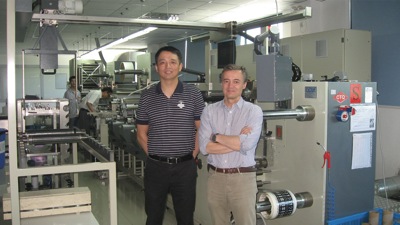 Federico d’Annunzio (right), Gidue managing director, together with Liu Ge, owner of Suzhou Tianjie Printing Co Ltd
Federico d’Annunzio (right), Gidue managing director, together with Liu Ge, owner of Suzhou Tianjie Printing Co Ltd
The press is handy and safe and the ‘Flower’ flexographic head is easy to use even for inexperienced operators. The M5 secures a perfect register on all the substrates and the flexo and the Stork RSI screen heads guarantee an impressive printing quality.
We became much more efficient and our customers are highly satisfied. We are now able to deliver 11 colour and multicolour labels within 3-4 working days.’
Steven Fan, managing director of Gidue China, added, ‘We have been present in China for many years and have installed several presses at many major label converters. Suzhou Tianjie is producing some of the most sophisticated and beautiful labels we have ever seen in our country, and we are very proud of our partnership with the company. Its manufacturing quality will help the whole Chinese label industry.’
Beyond the vista
Back in the UK, the installation in January 2013 of a Mark Andy P5 flexo press was the culmination of an investment programme by Stockport-based Vista Labels to develop new products and take print quality to a level that will exceed HD Flexo, according to the company’s chairman, Don Grice.
Already a confirmed Mark Andy user, with seven 2200 lines and a 4150, Vista has always specified the 280 mm web width because it suits the company’s portfolio of customers. All are eight colour presses (with one exception), and have full UV curing with delam/relam and turn bars for printing on the reverse of the web.
In recent times, the company has also added an extra 50% to its production floorspace, as well as building a new warehouse facility to handle the extra volume of materials processed by its staff of 38. This ongoing investment, which also included 100% inspection equipment and a BrailleMaker 1 line, combined with a major sales push and strenuous programme of product development has seen the company go from strength to strength, said Mr Grice.
Production director, Stuart Mellish, believed the company had gone as far as it could go with running speeds so knew that any further efficiency had to come from reduced downtime and lower waste levels. ‘One demonstration of our own work on the Mark Andy P5 was enough to show us the way ahead. We trialled our most difficult job and made ready in less than three minutes – amazing! It held superb register from the start, and handled a difficult substrate at high speed without a problem,’ he commented.
Since its installation, the new press has significantly cut waste levels by up to 80%, from typically 150 metres down to 30. Along with the lower fixed costs of running a 280 mm press compared with wider web widths, Vista sees a healthy bottom line on the type of work in which it specialises. ‘We have always focused on short term response and flexible capacity, and are currently working closelywith a local repro house to develop technology that we believe will take flexo to a new level, beyond the current industry benchmark of HD,’ said Mr Grice.
The company has the demand for it, and knows its new Mark Andy P5, fitted with chill rolls and a motorised laminating unit, is capable of producing it. So for Vista, it is another platform on which to build its ethos of ‘continuous improvement’.
Mr Grice acknowledged the way in which the new press uses its servo functions to shorten makeready times and improve register. ‘It’s an operator’s dream because it makes difficult jobs appear easy. All of our press minders want to work on it, and in truth I’d like to install more P5s.’
With a stable workforce that averages 20+ years of service, and a healthy sales projection of 10% growth for the next financial year, Vista Labels is a good example of how investment in new technology, coupled with experience, offers a path to success in today’s volatile label market.
Future proofing
For TW Parkers, a self-adhesive label and packaging converter, and the UK’s leading supplier of ‘postmould’ labelling, the latest investment came in the form of two Gallus EM 430 S lines at its plant in Bootle on Merseyside. The two flexo presses replaced three older 330 mm wide presses, and according to Parkers, have ‘doubled running speeds and have the additional benefit of a wider web width.’
Established originally in 1952 and still under family ownership, with Tim and Toby Parker at the helm, the company underwent a major programme of expansion five years ago. Since then, turnover has more than doubled to £7.3 million. Part of an investment programme that topped £2 million, the company chose Gallus presses after extensive testing and detailed negotiations to ensure that the manufacturer could precisely meet Parkers’ requirements, and, as far as was possible to predict, future-proof customer changes in demand.
‘We considered all options including having our existing presses reconditioned, but came to the conclusion that to move the game on we needed a fresh start. The Gallus machines offered that, handling all of the customer jobs we test printed,’ explained Eugene Roche, operations and development director. He is also quick to praise the support and understanding of the Gallus teams in the UK and St Gallen.
The EM 430 S is a further development of Gallus’ existing 410 mm wide press, and those at Parkers were the first off the production line, so a close working liaison between manufacturer and user was always going to be essential to maximise the benefit for both. Key to the success of the new presses has been their ability to hold tight register at high speed on PET, foil and unsupported film materials.
Part of the investment package included web monitoring with a camera to improve quality. Fitted with visual and audible warnings, the inspecting units can be set to pre-determined parameters to allow the presses to run at high speed. Specified with eight UV flexo stations, cold foil laminating, automatic register and two die stations, the Gallus EM 430 S is something of a hybrid, with servo drive and sleeve technology on each station for the loading and unloading of print cylinders and anilox rollers.
Gold win
The recent EFIA Print Awards 2013, held at the Reebok Stadium in Bolton, saw one of Edale’s UK customers, Douglas Storrie Labels, pick up a gold award for ‘Best flexo print on film’ in the narrow web category for the Wuffitmix entry.
Douglas Storrie Labels, based in Lytham-St-Anne’s, was instrumental in the development of the manufacturer’s FL-3 label and flexible packaging press, with input from the initial design stage through to the installation into a live production environment.
The FL-3 is a versatile servo-driven flexo press, utilising the latest servo technology providing pre-register, auto-register and print length control features to achieve the highest print quality whilst ensuring high speed changeovers, minimum downtime and minimum wastage.
It is fitted with the Pit Stop Colour Change system, which enables operators to complete a full print station colour change in under 70 seconds, and a four colour make ready is achieved in under 10 metres.
Chris Chappel, sales manager for UK and Ireland, commented, ‘On behalf of all at Edale, we would like to extend congratulations to our award winning customers, and we look forward to continuing our working relationship together with a lot more trophies! The quality that Douglas Storrie Labels are printing on its Edale FL-3 is second to none, and this award certainly helps to cement this.’
